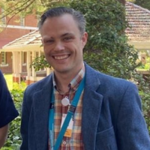Mike Kendall
AMSA 2025 Rural Psychiatry Placement Bursary Reflection

Mike Kendall
Medical Student 3rd year at University of Western Australia
As a Rural Clinical School of Western Australia student, I feel very fortunate to have seen a variety of psychiatry practiced in diverse settings of diverse populations. I have felt very supported and welcomed by the team as part of the acute infant, child, adolescent and adult mental health services.
During my time in the acute inpatient setting and in community outpatient setting of my rural psychiatric placement I came to a deeper understanding of the unique stressors, opportunities and strengths of the community as well as the commonalities between metro and regional presentations.
I have started to understand the different presentations of mental health within rural communities are often not well explain, understood or reported on in textbooks and often require an understanding of rural life, the seasons and local history. This was beautifully demonstrated for me by my supervising clinicians with several clients from the agricultural and construction industries.
I loved the ability to provide individualised care and liaise closely with the multidisciplinary team; this included a quick phone call to a rural GP or a brief handover to a local psychologist, above and beyond a standard referral, who all knew each other and understood the specific challenges of the client.
The MDT aspect of my placement was especially well integrated into my placement. A strength of a regional community often sits in the resourcefulness of its population. This included medical staff such as general practitioners, psychologists, occupational therapists, nursing specialists, Aboriginal liaison officers and social workers. I found the relaxed and flexible nature of the team a stark contrast to metro formalities.
This placement has opened my prospects to the meaningful and rewarding careers possible in rural psychiatry as well as putting me in contact with practising consultants who graduated through rural and regional training schemes that I had not previously known about. As a result of this placement, I have decided to spend my final year in a regional location and look forward to my next psychiatric rotation with a mind to applying for training.
As a Rural Clinical School of Western Australia student, I feel very fortunate to have seen a variety of psychiatry practiced in diverse settings of diverse populations. I have felt very supported and welcomed by the team as part of the acute infant, child, adolescent and adult mental health services.
During my time in the acute inpatient setting and in community outpatient setting of my rural psychiatric placement I came to a deeper understanding of the unique stressors, opportunities and strengths of the community as well as the commonalities between metro and regional presentations.
I have started to understand the different presentations of mental health within rural communities are often not well explain, understood or reported on in textbooks and often require an understanding of rural life, the seasons and local history. This was beautifully demonstrated for me by my supervising clinicians with several clients from the agricultural and construction industries.
I loved the ability to provide individualised care and liaise closely with the multidisciplinary team; this included a quick phone call to a rural GP or a brief handover to a local psychologist, above and beyond a standard referral, who all knew each other and understood the specific challenges of the client.
The MDT aspect of my placement was especially well integrated into my placement. A strength of a regional community often sits in the resourcefulness of its population. This included medical staff such as general practitioners, psychologists, occupational therapists, nursing specialists, Aboriginal liaison officers and social workers. I found the relaxed and flexible nature of the team a stark contrast to metro formalities.
This placement has opened my prospects to the meaningful and rewarding careers possible in rural psychiatry as well as putting me in contact with practising consultants who graduated through rural and regional training schemes that I had not previously known about. As a result of this placement, I have decided to spend my final year in a regional location and look forward to my next psychiatric rotation with a mind to applying for training.
